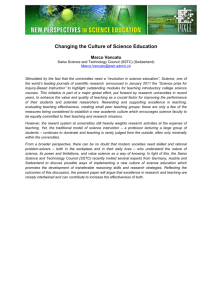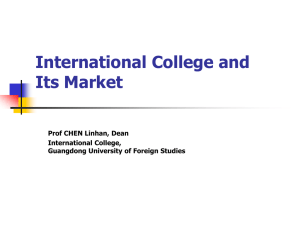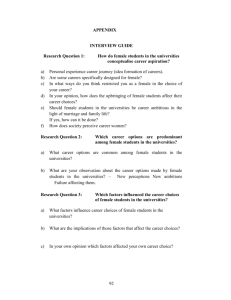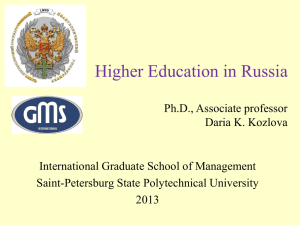Project Description
advertisement
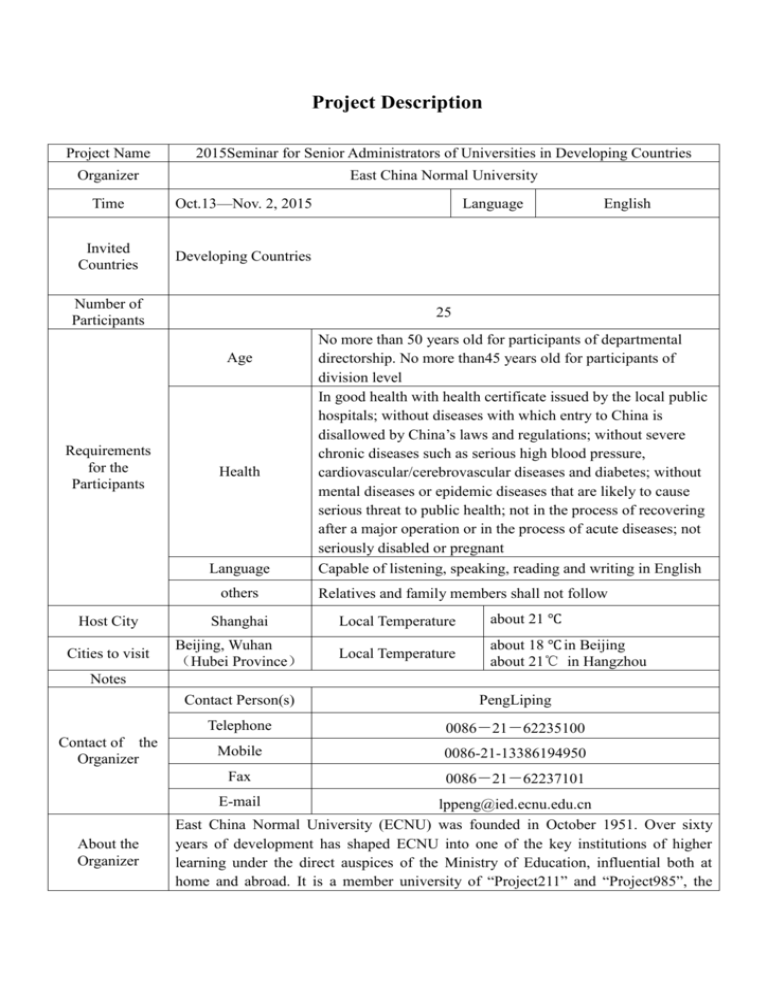
Project Description Project Name 2015Seminar for Senior Administrators of Universities in Developing Countries Organizer East China Normal University Time Oct.13—Nov. 2, 2015 Invited Countries Developing Countries Number of Participants English 25 Age Requirements for the Participants Language Health Language others No more than 50 years old for participants of departmental directorship. No more than45 years old for participants of division level In good health with health certificate issued by the local public hospitals; without diseases with which entry to China is disallowed by China’s laws and regulations; without severe chronic diseases such as serious high blood pressure, cardiovascular/cerebrovascular diseases and diabetes; without mental diseases or epidemic diseases that are likely to cause serious threat to public health; not in the process of recovering after a major operation or in the process of acute diseases; not seriously disabled or pregnant Capable of listening, speaking, reading and writing in English Relatives and family members shall not follow Host City Shanghai Local Temperature about 21 ℃ Cities to visit Beijing, Wuhan (Hubei Province) Local Temperature about 18 ℃ in Beijing about 21℃ in Hangzhou Notes Contact of the Organizer Contact Person(s) PengLiping Telephone 0086-21-62235100 Mobile 0086-21-13386194950 Fax 0086-21-62237101 E-mail About the Organizer lppeng@ied.ecnu.edu.cn East China Normal University (ECNU) was founded in October 1951. Over sixty years of development has shaped ECNU into one of the key institutions of higher learning under the direct auspices of the Ministry of Education, influential both at home and abroad. It is a member university of “Project211” and “Project985”, the latter of which is composed of the group of 39 tier one universities in China. The University has always attached great importance to the integration of the special characteristics of a normal university and academic excellence with equal emphasis on teaching and scientific research, and has, thus, developed into a university not only strong in educational science but also strong in the fields of social science, humanities, natural sciences, science and technology and management science. The International Center for Teacher Education of ECNU is an academic supportive institute for UNESCO Chair on Teacher Education at ECNU and has undertaken International Master’s Program for Educational Leadership and Policy and short-term seminars for principals from developing countries that are sponsored by the Ministry of Commerce of China for years. The University has 15 full-time schools, namely School of Humanities, School of Educational Science, School of Educational Administration, School of Preschool Education and Special Education, School of Foreign Languages, School of Business , School of Law and Politics, School of Life Science, School of Physical Education and Health Care, School of Science and Engineering, School of Natural Resources and Environmental Science, School of Information Science and Technology, School of Teaching Chinese as a Foreign Language, School of software engineering and the Vocational College. These schools consist of 35 departments offering 55 undergraduate programs, 5 of which, i.e. Chinese, History, Mathematics, Geography and Psychology, are on the list of State Training and Research Bases for Liberal Arts and Natural Sciences. Besides, the University has 6 state key programs, 2 state key laboratories, 6 key laboratories under the Ministry of Education and 6 key research bases for humanities and social sciences approved by the Ministry of Education, and over 40 research institutes and a number of multi-disciplinary research, experiment, computing and testing centers. The Graduate School offers 73 doctoral programs, 118 Master’s programs (including Master’s Degree of Education and MPA), and has 10 mobile post-doctoral research stations. In addition, the University has On-Line School of Education, College of Continuing Education and International College of Chinese Culture. Among the total staff of over 4,000, there are nearly 2,000 full-time teachers, including 14 national academicians and nearly 1,200 professors and associate professors, many of whom enjoy high reputation in their respective academic circles. Now there are 14,000 undergraduate students, 14,000 graduate students, and 3700 international students. The university has two campuses, that is, Putuo Campus and Minhang campus. The main contents of the Seminar include: 1. Overview of China’s Reform and Open-door policies and innovative practices Seminar Content in educational changes driven by and contributing to economic and social development 2. Overview of China’s Higher Education Reform and Policy 3. Quality Management of Higher Education in China 4. Chinese Culture Overview and Educational Philosophy 5. Targets and Measures: China’s Cultivation of Postgraduates 6. Curriculum diversity and Students development in China’s Universities 7. Basis experiences: Service of China’s Universities for society 8. The Personnel System and Its Development in Universities of China 9. The Reform and Development of Shanghai’s Higher Education 10. System for Scientific Research in Universities of China 11: Internationalization of Universities of China 12: Lifelong Education in Universities of China: Concept and Innovation 13: Application and Innovation of ICT in Education in China: Concept and Innovation 14: Discipline Team Building in Universities of China 15: University Operation of NYU Shanghai 16: Vocational Education and Economic Development in China Experts on education from within and outside East China Normal University with some from around the world will be invited to give lectures and facilitate two-way interactions with the trainers. During the seminar, principals will visit different kinds of schools in Shanghai, Beijing, and Hunan province. In addition, there will be field trips to places of cultural, economic and educational interests. In this way, principals can better understand what they have learned from the lectures and develop better understanding of what China has achieved in education within the broad context of socio-economic and cultural development since reform and opening-up since early 1980’s. At the same time, the opportunities of enhanced the partnership and two-way cooperation in education between China and other developing countries could be facilitated in the years to come.



